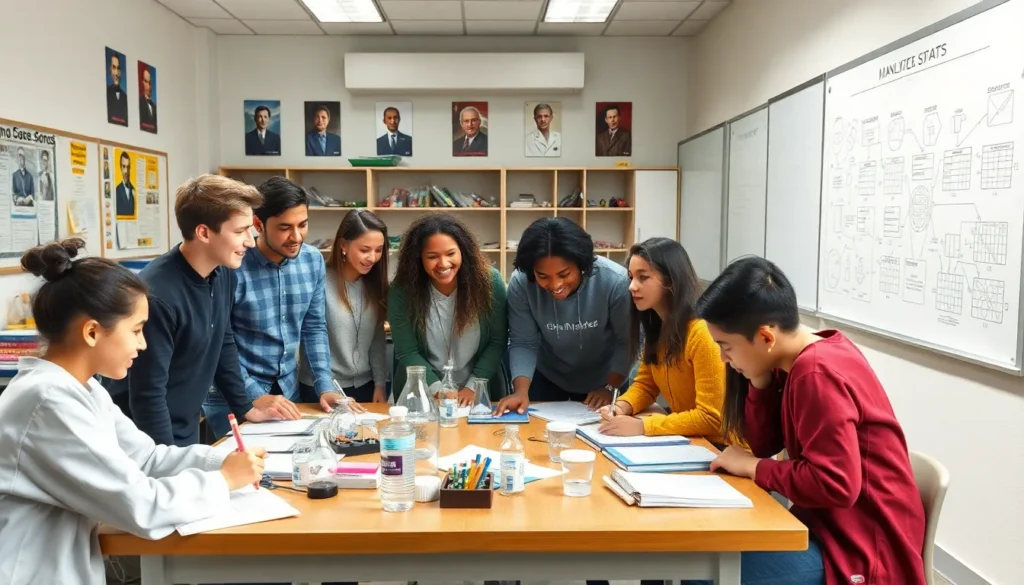Table of Contents
ToggleIn a world where information is at our fingertips, traditional teaching methods often fall short in fostering critical thinking and problem-solving skills. Inquiry-based learning emerges as a dynamic approach that empowers students to take charge of their education. By encouraging curiosity and exploration, this method transforms passive learners into active participants in their own learning journeys.
Through asking questions and seeking answers, students engage deeply with the material, developing a sense of ownership over their knowledge. Inquiry-based learning not only enhances understanding but also cultivates essential skills that prepare students for real-world challenges. As educators increasingly recognize its value, embracing this innovative approach can lead to more meaningful and lasting educational experiences.
Overview of Inquiry-Based Learning
Inquiry-based learning is an educational approach that emphasizes student-led exploration and critical thinking. This method shifts the traditional focus from teacher-driven instruction to a model that values student questions as the foundation for learning. Educators guide students in investigating topics through observations, experiments, and discussion, fostering an environment conducive to curiosity and discovery.
Key components of inquiry-based learning include:
- Questioning: Students craft questions that drive their investigations, enhancing engagement and ownership.
- Investigation: Learners conduct experiments, gather data, and analyze results, promoting hands-on experience and deeper understanding.
- Collaboration: Students work together, sharing insights and developing communication and teamwork skills, which are crucial for their future careers.
- Reflection: Learners frequently reflect on their inquiries, helping to solidify their understanding and encouraging a continual learning process.
Numerous studies support the effectiveness of inquiry-based learning. Research conducted by the National Science Foundation indicates that students who engage in inquiry-based practices demonstrate higher levels of understanding and retention compared to those exposed to traditional methods. Furthermore, inquiry-based learning prepares students to tackle complex real-world problems by developing essential skills such as critical thinking, adaptability, and problem-solving.
Adopting this approach requires training and a shift in mindset among educators, but its benefits can lead to a more engaged and knowledgeable student body prepared for future challenges.
Benefits of Inquiry-Based Learning

Inquiry-based learning offers numerous advantages that enhance the educational experience, particularly in developing essential skills for the modern world. This approach cultivates an environment where curiosity thrives and students actively engage with their learning process.
Enhanced Critical Thinking Skills
Enhanced critical thinking skills result from inquiry-based learning. Students analyze information, evaluate sources, and synthesize findings through guided inquiry. This method encourages them to ask questions, challenge assumptions, and explore multiple perspectives. Research indicates that this approach leads to improved problem-solving abilities and better decision-making skills, equipping students to tackle complex challenges in academic and real-world settings.
Increased Student Engagement
Increased student engagement manifests through inquiry-based learning. Students take ownership of their learning by exploring topics they find interesting, leading to higher motivation levels. Collaborative projects foster teamwork and communication skills, as students share ideas and work together towards common goals. Studies show that students engaged in inquiry-based practices display a deeper understanding of content and a greater desire to learn, resulting in improved academic performance and retention rates.
Key Principles of Inquiry-Based Learning
Inquiry-based learning centers around principles that enhance student engagement and understanding. Two essential principles are the student-centered approach and the use of active learning strategies.
Student-Centered Approach
A student-centered approach places learners at the forefront of the educational process. Learners explore topics of personal interest and relevance, guiding their own inquiries. This method promotes autonomy, as students formulate their own questions and seek answers through investigation. Teachers act as facilitators, supporting each student’s unique learning journey. This enhances motivation and commitment, fostering a deeper connection to the material.
Active Learning Strategies
Active learning strategies engage students directly in the learning process. These strategies include problem-solving tasks, group discussions, and hands-on experimentation. Such methods require students to apply knowledge in real-world contexts, reinforcing understanding. Collaborative projects further encourage communication and teamwork, essential skills in today’s workforce. By participating actively, students enhance critical thinking, retention, and ultimately, their overall learning experience.
Implementing Inquiry-Based Learning in the Classroom
Inquiry-based learning requires careful implementation to maximize its benefits. Educators must focus on planning effective projects and employing suitable assessment strategies.
Planning Effective Inquiry Projects
Planning effective inquiry projects involves several key steps.
- Identify Learning Objectives: Determine specific goals aligned with curriculum standards. Clear objectives guide the inquiry process and ensure relevance to student needs.
- Choose Engaging Topics: Select topics that spark student interest. Engaging subjects foster excitement and motivation, encouraging students to pursue deeper inquiries.
- Develop Guiding Questions: Formulate open-ended questions that stimulate curiosity. These questions should challenge students to explore, analyze, and synthesize information.
- Design Collaborative Activities: Incorporate group work to enhance collaboration. Collaborative activities encourage knowledge sharing and diverse perspectives, enriching the learning experience.
- Plan for Resources: Identify necessary resources, including materials and technology. Providing access to various information sources supports effective inquiry.
Effective planning creates a roadmap for successful inquiry-based projects, promoting engagement and deeper learning.
Assessment Strategies for Inquiry-Based Learning
Implementing suitable assessment strategies is crucial to evaluate inquiry-based learning outcomes.
- Formative Assessments: Use formative assessments throughout the inquiry process. These assessments, such as observation and feedback, help track student progress and inform instructional adjustments.
- Student Reflection: Encourage students to reflect on their learning experiences. Reflection enhances metacognitive skills and allows students to identify strengths and areas for improvement.
- Rubrics for Performance Tasks: Develop clear rubrics for evaluating projects. Rubrics establish expectations and criteria for quality, providing objective feedback on student performance.
- Peer Assessments: Incorporate peer assessments to foster collaboration. Students gain insights from one another’s work and develop critical evaluation skills.
- Summative Assessments: Conduct summative assessments to measure overall understanding. These assessments can include presentations, reports, or portfolios that showcase students’ inquiries and findings.
Implementing these assessment strategies provides educators with meaningful insights into student learning while fostering a reflective and collaborative classroom environment.
Challenges of Inquiry-Based Learning
Inquiry-based learning presents several challenges that educators must navigate for successful implementation.
- Resource Requirements: Inquiry-based learning often necessitates a range of resources, including materials, technology, and access to information. Shortages in these resources can hinder the effectiveness of the approach.
- Teacher Preparedness: Educators frequently face difficulties in transitioning from traditional teaching methods to inquiry-based practices. Professional development and training are essential to equip teachers with the necessary skills and methods for facilitating inquiry effectively.
- Classroom Management: Managing a classroom focused on inquiry can be complex. Teachers need to balance structure and freedom to allow for exploration while maintaining a productive learning environment.
- Assessment Complexity: Traditional assessment methods may not align with inquiry-based learning outcomes. Developing valid assessment strategies that accurately measure student understanding and skills can prove challenging for educators.
- Time Constraints: Instructional time often limits the implementation of in-depth inquiry projects. Teachers may struggle to fit comprehensive inquiry activities into predetermined curriculum timelines.
- Student Resistance: Some students may resist this format, preferring direct instruction. Educators must address these concerns by guiding students through the inquiry process and demonstrating its value.
- Curriculum Alignment: Ensuring that inquiry projects align with curriculum standards poses another hurdle. Teachers must develop inquiry-based activities that meet educational requirements while fostering student engagement.
- Varying Student Abilities: Students exhibit diverse skill levels and learning styles, making it challenging to create inquiry tasks that cater to all learners. Differentiated instruction becomes crucial in addressing these individual needs.
These challenges require strategic planning and support to effectively implement inquiry-based learning in educational settings.
Inquiry-based learning represents a transformative approach to education that empowers students to become active participants in their learning journey. By fostering curiosity and encouraging exploration educators can cultivate critical thinking and problem-solving skills essential for success in today’s complex world.
While challenges exist in implementing this method effective planning and support can lead to meaningful outcomes. As more educators recognize the value of inquiry-based practices the potential for enhanced student engagement and understanding grows. Embracing this approach not only prepares students for academic challenges but also equips them with the skills needed to navigate real-world situations confidently. The shift towards inquiry-based learning is not just a trend but a necessary evolution in education.



